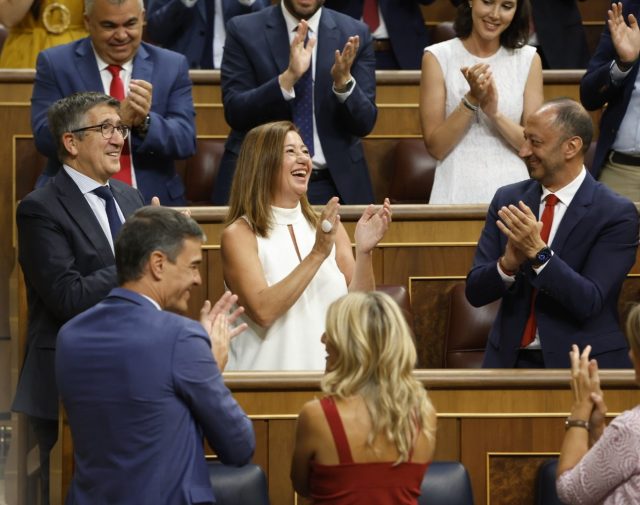
The former president of the Balearic Islands region, and MP of the Spanish Socialist Party (PSOE; S&D), Francina Armengol, became the fourth woman to hold the presidency of the Spanish Congress. The Socialist surpassed the required 176 absolute majority in a first round of voting.
Armengol is now the third most powerful authority of the State, behind the King and the Prime Minister. She is the current secretary general of the PSOE in the Balearic Islands and was the first woman to become president of the Autonomous Community, between 2015 and 2023.
The president of Congress is responsible for directing the debates, maintaining order in the chamber and ensuring compliance with the bylaws and norms of Parliament. Also, it is up for the president to set the date of an investiture session for the to-be premiere, after the Head of State–the King–finishes his round of consultations and nominantes a candidate.
She received the support from 178 MPs, including the seven of fugitive Carles Puigdemont’s Junts per Catalunya and the rest of acting Prime Minister Pedro Sánchez’s parliamentary partners, such as the progressive party Sumar.
Armengol’s PSOE negotiated the support of the seven MPs of the “Republican Left” of Catalonia, Esquerra Republicana (ERC). It should be noted that none of the Catalan parties had decided the direction of their vote until an hour before the beginning of the parliamentaty session. In addition, six MPs of the ETA-linked Euskal Harria Bildu, five MPs of the Basque Nationalist Party (PNV) and the one MP of the Galician Nationalist Bloc, have supported the PSOE.
The agreement with the Catalan separatists has not caught the Spanish citizens by surprise. The PSOE has agreed to formalize the use of Catalan (and Basque, and Galician) in all parliamentary procedures, and as official languages of the European Union. They also promised to summon two commissions of inquiry into the Pegasus case.
However, despite having supported the Socialists with the presidency of Parliament, Carles Puigdemont has clarified that there is still no pact for the investiture of Pedro Sánchez as president of the Government: “For some it will seem like too much, and for others, it will seem too little. It is a negotiation for the leadership of Congress.” He added that talks about the investiture are “exactly where they were” the day after the General Election. Gabriel Rufián, the leader of ERC echoed these remarks. This has led observers to belive Sánchez might be willing to offer the Catalan separatists an independence referendum to secure the premiership.
The other possible candidate to preside over Congress was the current secretary general of the Popular Party (PP; EPP), Cuca Gamarra. However, she underperformed, only garnering the votes from her parliamentary group, from the Union of the Navarran People (UPN), and from the Canarian Coalition (CC) regional parties.
Not even the Conservative party Vox (ECR) voted for her. The PP denied Vox’s participation in the Congressional Leadership. So, they decided to go with one of their own. Vox’s 33 MPs supported Ignacio Gil Lázaro.
After Armengol’s election, the remaining 350 MPs elected the four vice-presidents of the chamber. Then they selected four secretaries.
In addition to the presidency of the Chamber, the PP lost the first vice presidency. With 113 votes, the Socialist MP Alfonso Rodríguez Gómez de Celis will repeat in this post from the previous legislative period. The second vice president is José Antonio Bermúdez de Castro, a PP MP who won by 73 votes.
The PSOE, PP, and Sumar have divided the four Vice Presidencies of Congress. ECR’s Vox–which has a larger share of parliamentary representation than Sumar–did not make it into the governing body of the Chamber.



 Subscribe
Subscribe